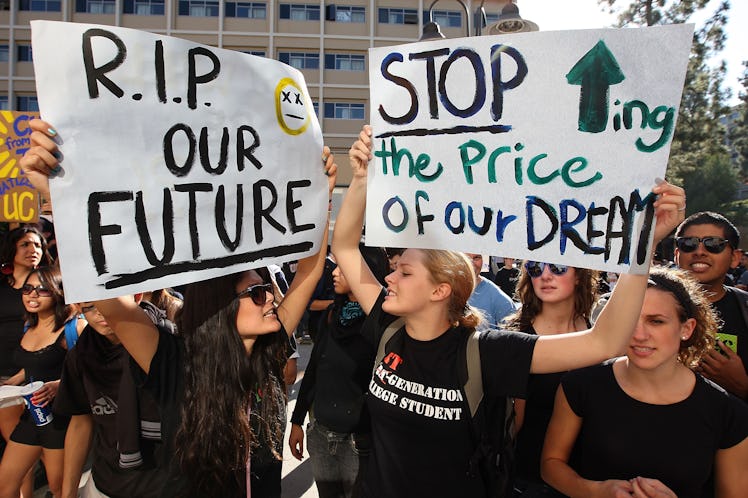
This Study Will Validate All Your Feelings About Being Too Poor For, Well, Everything
If you've been harangued by an elder for splurging on the cage-free, no-hormone-added, grass-fed eggs when your account balance is low, new research might offer some solace to justify it. Millennials are poorer than baby boomers, a new study by the Federal Reserve shows, and for a whole lot of reasons. The report adds a whole new meaning to the Parks and Recreation philosophy of "Treat Yo Self."
"Relative to members of earlier generations, millennials are more racially diverse, more educated, and more likely to have deferred marriage," the report states. But the buying power of millennials relative to their predecessors is where the big difference lies. "Millennials are less well off than members of earlier generations when they were young, with lower earnings, fewer assets, and less wealth."
Millennials were particularly hard hit by coming of age during the Great Recession, the report found. Whereas previous generations exited high school and college with limited debt and robust opportunities in the labor force, graduates of the last ten years are likely to have a higher burden of debt than baby boomers, as well as face economic obstacles like higher health insurance and college tuition costs that may prevent higher savings account balances.
Cue the frustrated "been-saying-this" commentary from everyone you follow on social.
"Sometimes I think about how my mom had 2 kids and owned two homes when she was 35," tweeted cultural critic Kimberley Nicole Foster, citing the report. Given the lower level of expendable income of this generation, she added, "[T]his is not about individual decision making."
The report went on, though, to dispel some of the most common myths about millennials' spending habits that have given the generation an underserved bad rap. For one, that they favor "experiences" over products.
"We find little evidence that millennial households have tastes and preference for consumption that are lower than those of earlier generations, once the effects of age, income, and a wide range of demographic characteristics are taken into account," the authors wrote. In other words: millennials like buying stuff just as much as their parents, but they just can't afford to do as much of it.
Second, millennials get blamed for the demise of certain industries like real estate, high-end retail, and luxury cars because they're just not buying them. This same age group has been criticized for not being able to buy those goods because they're all out overspending on avocado toast and craft lattes. But that might overlook the larger issue.
While most millennials do tend to have a taste for authentic and artisanal products, there's no avoiding the simple math that they don't have as much money to spend as their parents did at this age. Sure, maybe the average twenty-something would prefer to splurge on a trip to Nepal, but they don't have an extra three grand laying around. What they can spend on non-essentials, though, might allow for a couple of brunches out with friends, a concert ticket, and a new jacket. So to that end, it's possible that millennials' spending habits aren't necessarily a reflection of their values, priorities, and preferences, as much as a straight-up budget constraint.
In fact, as the report also showed, millennials actually spend about the same amount on food as previous generations. The biggest difference is that they spend a much higher portion of their incomes on housing, per ABC. Average rent prices now have ballooned 46 percent compared from decades ago, adjusted for inflation.
So if you feel bad that they're behind financially from where your parents were at your age? It might not be all your fault. The standard advice is to forego your weekly Starbucks fix to save an extra few hundred dollars a year. That's all well and good, but it's is a moot point compared to the $10,000 typical down payment you'd need for the median U.S. home price of $200,000 (although Californians like me know that's a laughable low-ball of a fantasy). So it's hard to blame people for deciding to add that small luxury to their weekly spending when they don't foresee making that big-ticket purchase anytime soon.
Sure, a weekly avocado toast probably isn't helping you get any closer to buying a Cartier anything or a condo, but generally speaking, it's not the only reason this generation is poorer. So if you really can't resist the urge to defend your generation to its elders: an "I told you so" may be deserved.